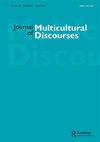Cuts destroy, hurt, kill: a critical metaphor analysis of the response of UK academics to the UK overseas aid budget funding cuts
IF 1.6
Q3 COMMUNICATION
引用次数: 3
Abstract
ABSTRACT In this article, we analyse the response of UK academics to the UK government decision to cut international development research funding as part of the overseas aid budget reduction, undertaken in March 2021. This decision affects and will have long-lasting effects on any research project involving the UK and international partners, particularly in Global South contexts. We use Critical Metaphor Analysis (CMA) to analyse news, blogs, interviews that UK-based academics wrote in response to the cuts announcement, from 11 March 2021 to 30 April 2021. We identified the following metaphors: CUTS ARE AN ENTITY; CUTS ARE A THREAT, CUTS ARE ILLNESS, CUTS ARE VIOLENCE; plus, on the other hand, RESEARCH IS HEALTH, RESEARCH IS A JOURNEY, RESEARCH IS CONNECTION. UK academics have used ‘idioms of distress’, which are cultural expressions, often metaphorical, through which people articulate distress. Therefore, our contribution is threefold. First, we suggest that the metaphors used have a persuasive and evaluative aim and function. Second, we open up a space for an interdisciplinarity between CMA and ‘idioms of distress’. Third, we warn about the need for the UK government and responsible institutional bodies to restore communication and trust with the global academic research community in International Development.削减破坏,伤害,杀死:对英国学者对英国海外援助预算资金削减的反应的批判性隐喻分析
摘要在本文中,我们分析了英国学者对英国政府决定削减国际发展研究资金的反应,该决定是2021年3月削减海外援助预算的一部分。这一决定影响并将对涉及英国和国际合作伙伴的任何研究项目产生长期影响,特别是在全球南方背景下。我们使用批判性隐喻分析(CMA)来分析2021年3月11日至2021年4月30日期间英国学者为回应裁员公告而撰写的新闻、博客和采访。我们发现了以下隐喻:切口是一个整体;削减是一种威胁,削减是疾病,削减是暴力;另外,另一方面,研究就是健康,研究就是旅程,研究就是联系。英国学者使用了“痛苦习语”,这是一种文化表达,通常是隐喻性的,人们通过它表达痛苦。因此,我们的贡献有三方面。首先,我们认为所使用的隐喻具有说服和评价的目的和功能。其次,我们在CMA和“痛苦习语”之间开辟了一个跨学科的空间。第三,我们警告说,英国政府和负责任的机构需要恢复与国际发展领域全球学术研究界的沟通和信任。
本文章由计算机程序翻译,如有差异,请以英文原文为准。
求助全文
约1分钟内获得全文
求助全文

 求助内容:
求助内容: 应助结果提醒方式:
应助结果提醒方式:


